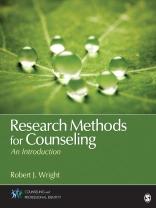This text provides a rich, culturally sensitive presentation of current research techniques in counseling. Author Robert J. Wright introduces the theory and research involved in research design, measurement, and assessment with an appealingly clear writing style. He addresses ways to meet the requirements of providing the data needed to facilitate evidence-based therapy and interventions with clients, and also explains methods for the evaluation of counseling programs and practices. This comprehensive resource covers a broad range of research methods topics including qualitative research, action research, quantitative research including, sampling and probability, and probability-based hypothesis testing. Coverage of both action research and mixed methods research designs are also included.
Jadual kandungan
Preface
SECTION I: Using and Valuing Counseling Research
Chapter 1: The Research Consumer
Chapter 2: Ethical Research Practices
Chapter 3: Reading and Reviewing the Literature
SECTION II: Qualitative Approaches for Research
Chapter 4: Qualitatively Research I, the Tools and Skills
Chapter 5: Qualitative Research II, the Processes
Chapter 6: Action Research Methods
SECTION III: Descriptive Statistics and Correlation
Chapter 7: Nature of Variables and Data
Chapter 8: Mutual Dependence and Correlational Relationships
SECTION IV: Inferential Statistics and Hypothesis Testing
Chapter 9: Sampling and Sampling Error
Chapter 10: Scientific Method and Hypotheses Testing
Chapter 11: Inferences Using Categorical and Nominal Information
SECTION V: Measurement and Psychological Assessments
Chapter 12: Understanding and Evaluating Test Scores
Chapter 13: Instrument Development and Survey Research
SECTION VI: Organizing and Applying Research Skills
Chapter 14: Organizing Valid Research
Chapter 15: Mixed Methods Research
Chapter 16: Approaches for Evaluation
Chapter 17: Writing Research Proposals and Reports
Appendix A
Appendix B
Appendix C
Appendix D
Mengenai Pengarang
Robert Wright earned a Bachelor’s degree in Chemistry from Kutztown University of Pennsylvania in 1966, and began teaching high school science. A few years later in 1969 he earned a Masters degree in school counseling from West Chester University and was employed as a public school counselor, first with high school students and later with middle school students. In 1974 he completed a doctorate (Ph.D.) in Educational Psychology with specializations in child & adolescent development and educational measurement from Temple University. As part of that degree he completed a clinical fellowship in rehabilitation counseling at Moss Hospital, part of the Albert Einstein Medical Center (Philadelphia). Following graduation he completed advanced studies in school psychology at Lehigh University. Professor Wright has taught counseling and supervised counseling interns and has also taught educational measurement, and educational statistics & research for graduate students in counseling. He is a member of the American Counseling Association, the American School Counselor Association, the American Psychological Association (Division 17, counseling psychology), the Association for Counselor Education and Supervision, and the American Educational Research Association. He is professionally licensed to practice in Pennsylvania. During his career Professor Wright chaired 114 doctoral dissertations, published and presented over 120 articles and paper presentations and has had four books published.












